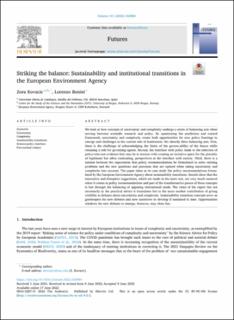| dc.contributor.author | Kovacic, Zora | |
| dc.contributor.author | Benini, Lorenzo | |
| dc.date.accessioned | 2023-01-18T14:45:01Z | |
| dc.date.available | 2023-01-18T14:45:01Z | |
| dc.date.created | 2022-09-23T14:40:02Z | |
| dc.date.issued | 2022 | |
| dc.identifier.issn | 0016-3287 | |
| dc.identifier.uri | https://hdl.handle.net/11250/3044406 | |
| dc.description.abstract | We look at how concepts of uncertainty and complexity undergo a series of balancing acts when moving between scientific research and policy. By questioning the prediction and control framework, uncertainty and complexity create both opportunities for new policy framings to emerge and challenges to the current role of institutions. We identify three balancing acts. First, there is the challenge of acknowledging the limits of the govern-ability of the future while retaining a role for governing agents. Second, the interface with policy leads to the selection of policy-relevant evidence that may be in tension with creating an inclusive space for the plurality of legitimate but often contrasting, perspectives at the interface with society. Third, there is a tension between the expectation that policy recommendations be formulated to solve existing problems and the new questions and processes that are opened when taking uncertainty and complexity into account. The paper takes as its case study the policy recommendations formulated by the European Environment Agency about sustainability transitions. Results show that the innovative and disruptive suggestions, which are made in the main text, are very much nuanced when it comes to policy recommendations and part of the transformative power of these concepts is lost through the balancing of opposing institutional needs. The value of the report lies not necessarily in the practical advice it formulates but in the more modest contribution of giving visibility to debates about uncertainty and complexity. Sustainability transition concepts serve as gatekeepers for new debates and new narratives to develop if sustained in time. Opportunities windows for new debates to emerge, however, may close fast. | en_US |
| dc.language.iso | eng | en_US |
| dc.publisher | Elsevier | en_US |
| dc.rights | Attribution-NonCommercial-NoDerivatives 4.0 Internasjonal | * |
| dc.rights.uri | http://creativecommons.org/licenses/by-nc-nd/4.0/deed.no | * |
| dc.title | Striking the balance: Sustainability and institutional transitions in the European Environment Agency | en_US |
| dc.type | Journal article | en_US |
| dc.type | Peer reviewed | en_US |
| dc.description.version | publishedVersion | en_US |
| dc.rights.holder | Copyright 2022 the authors | en_US |
| dc.source.articlenumber | 102984 | en_US |
| cristin.ispublished | true | |
| cristin.fulltext | original | |
| cristin.qualitycode | 1 | |
| dc.identifier.doi | 10.1016/j.futures.2022.102984 | |
| dc.identifier.cristin | 2054889 | |
| dc.source.journal | Futures: The journal of policy, planning and futures studies | en_US |
| dc.identifier.citation | Futures: The journal of policy, planning and futures studies. 2022, 141, 102984. | en_US |
| dc.source.volume | 141 | en_US |

